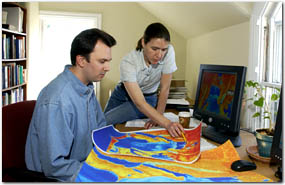
|
 |
Research > Centers > Marine Policy Center
Marine Policy Center
 |
 |
|
Ann Mulligan of the Marine Policy Center and Matt Charette of the Marine Chemistry and Geochemistry Department discuss aerial photographs of Waquoit Bay, Falmouth, MA, showing groundwater discharge patterns, part of a study to understand nutrient loading. Excess nutrients in Waquoit Bay are believed to be responsible for a decline in eelgrass, which serves as habitat for scallops. (Photo by Tom Kleindinst) |
The Marine Policy Center (MPC) conducts social scientific research that integrates economics, policy analysis, and law with the Institution’s strengths in ocean sciences. Areas of recent research include fisheries and aquaculture, offshore oil and gas, marine transportation, and coastal and marine environmental management.
One recent MPC study addressed managing the introduction of nutrients, such as nitrogen, to coastal waters from agricultural and other human activities. Excess nutrients can lead to problems such as harmful algal blooms or “red tides,” mass mortalities of bottom-dwelling species, and loss of seagrass and coral reef habitats. Improved control of nutrient pollution requires better understanding of the source and behavior of nutrients, including the role of the ocean as both a nutrient source and sink (right). MPC researchers developed a model of nutrient management in a coastal community under conditions of uncertainty about nutrient sources. The results show that better oceanographic information can improve management by allowing more efficient regulation of nutrient sources.
MPC also recently launched a three-year project, funded by the Henry Luce Foundation, to strengthen the connection between oceanographic science and public policy through a visiting program for Congressional staff members, a seminar in public policy, and a science and public policy fellowship program. In 2002, MPC hosted a legislative assistant to the Chair of the House Subcommittee on Fisheries Conservation, Wildlife and Oceans. MPC researchers also conducted a weekly seminar that introduced WHOI students and scientists to the basic problems and methods of marine policy.
In the near future, MPC will examine environmental and policy issues associated with the siting of wind energy facilities in the coastal ocean. Another MPC study will estimate regional and national economic impacts of the introduction and spread of nonindigenous aquatic nuisance species and identify cost-effective policies for their control.
—Andrew Solow, MPC Director
|
|
